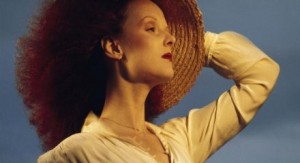A recent article in the Guardian got my attention. I am a firm believer in good nutrition, morale and overall well-being. It addresses the pressures media puts on both women, and men, to conform to a specific body shape. An often unhealthy and unrealistic body shape, only achieved by extreme dieting, exercise and mental anguish. What further gets my goat though is that waif-like models gracing magazine covers always seem to have such thick and gorgeous hair. And in truth, the two usually don’t go hand in hand. Proper nutrition and health are vital to your hair.
Great looking hair has always been associated with youth, sensuality, strength, and vitality. So it’s stretching reality when you see an undernourished woman with a pre-pubescent shape photo-shopped to sport Rapunzelesque locks. While you may be aware that the vast majority of media pictures are thoroughly airbrushed, looking at these images can still cause extreme body image problems. This is especially true amongst young men and women. They more than often than not send the wrong message that being unnaturally thin is healthy, desirable and sexually attractive. Some people, including models and celebrities, naturally have a thin physique. That’s likely down to genetics and a faster metabolism. But it’s often not the case, and the luscious hair you see in films and glossy magazines is a result of hair extensions, weaves or wigs. If you want beautiful hair, you need to nourish it. This also goes for you skin, body and psychological wellbeing.
As it is Thinning Hair Awareness Week, I would like to shed some light on this sensitive subject by dispelling one of the most common and counterproductive misconceptions – that hair loss and hair thinning predominately effects men.
Your hair is an excellent barometer for your general health. It’s not a vital tissue – emotionally it is very important, but physically you could live without it. This means your body doesn’t prioritize its nutritional needs. Your hair is also comprised of the second fastest growing cells in your body, so it needs a lot of energy to grow. This includes nutrients from proteins, complex carbohydrates, fruits and vegetables. If your diet is lacking, your hair is normally the first thing to suffer, and can fall out and thin.
The Importance of a Healthy Body and Diet
Snack
Energy to form hair cells drops 4 hours after eating a meal. Have a healthy snack, such as whole-wheat crackers or bread, fruit or vegetables between meals to keep your follicles nourished.
Don’t over-exercise
Extreme and compulsive exercise can raise testosterone levels, in both men and women. If you have follicle sensitivity, increased testosterone can cause hair thinning. Also, make sure to cater your nutrition to the amount of exercise you do. The more energy you expend, the more energy you need to take in!
Maintain a healthy weight
Being underweight can decrease a woman’s eostrogen levels. This can cause hair loss, as well as acne and increased body hair.
Proteins
Proteins are the building blocks for your hair – your hair is 85% protein. Include at least 120g with breakfast and lunch to help your hair be at its best. The best sources of protein are ‘first class proteins’ like eggs, poultry, red meat, fish and low-fat cottage cheese.
Complex Carbohydrates
Complex carbohydrates provide slow-released energy needed to maintain cell growth, like the growth of your hair. If you restrict your carbohydrate intake, your body can start to convert protein to energy, which is very taxing on your kidneys and liver.
Iron
Correct iron levels are vital to healthy hair. Low iron (anaemia) can cause hair loss and reduced growth. The best sources of iron are red meats like steak and liver. If you’re a menstruating woman try to eat red meat once or twice a week to replenish your stores.
Thyroid
Restrictive dieting can affect your thyroid and slow your metabolism. Proper thyroid function is important to healthy, beautiful hair. Also, eating well and consistently helps to raise your metabolism.
Always consult with a doctor before making any changes to your diet. But if you are trying to stay or get fit, I suggest a well-balanced eating plan including all food groups. And incorporating moderate exercise. You’ll both look and feel wonderful and your hair will benefit immensely.
Did you know there are as many women as men with hair loss?
There is a lot to say about hair loss: the causes, the treatments on offer and the psychological effects. The first thing to point out is that there is no over-the-counter hair-loss remedy, so don’t waste your money on trying them!
In fact, it is entirely natural for your hair to fall out- your whole head of hair is replaced every four years or so. There are also reasons for extra hair fall: spring and autumn. This extra loss can last four to six weeks, so don’t worry if it does. You need only be concerned about hair fall if it increases over a long period of time, or if you notice your hair is thinner.
Extra hair loss usually results from a combination of circumstances which affect both men and women. However women do not reach the stage a man does in the amount of loss and they rarely go bald. Circumstances leading to hair fall could include nutritional deficiencies or excesses, low iron levels and thyroid disturbances which you can ask your doctor to test for.
Stress is sometimes blamed for extra hair fall. This is not a myth. Stress, though a convoluted route, can produce more androgens, the male hormones that can be responsible for hair thinning.
If your hair is thinning, look first to your diet. Hair consists of protein and a common cause of thinning hair is a lack of dietary protein. The most important meals for protein intake are breakfast and lunch. First class proteins for hair are meat, fish, fowl, eggs, and – to an extent- low-fat cottage cheese.
You can read further information about hair loss on my blog or you can arrange a consultation for advice and treatment for the management of hair loss problems and ongoing hair care.


